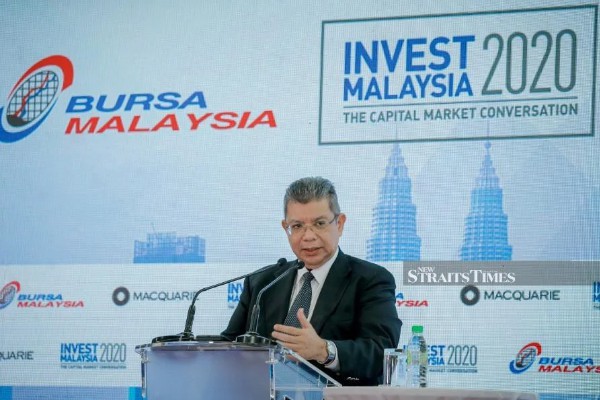KUALA LUMPUR: Malaysia will soon announce the Industry 4.0 plan and national digital roadmap, including digital infrastructure and data policy, Communications and and Multimedia Minister Datuk Saifuddin Abdullah said.
Further, he said the government will also ensure efficient roll-out of fifth-generation, or 5G networks after achieving a robust 4G platform.
Saifuddin said to date, the country has witnessed 71 5G usage demonstrations led by the private sectors namely Celcom, Digi.com, edotco, Maxis, Petronas, Telekom Malaysia, U Mobile and YTL across seven states with a total industry investment of RM131 million ringgit.
“It is very important to note that Malaysia is expediting the improvement of connectivity for both fiber optic and 4G as a means to ensure that the 5G rollout will be done in an efficient and effective manner; thereby benefitting the consumers without a significant increase in cost of service.
“Such a healthy ecosystem will contribute significantly to the national agenda of Digital Malaysia and thereby the national gross domestic product,” he said during Invest Malaysia 2020 organised by Bursa Malaysia and Macquarie here today.
Saifuddin said the role of Industry 4.0 becomes even more critical in the backdrop of a crisis such as Covid-19 and industry players regardless of sectors are now turning into utilising digital solutions.
“As businesses think about restoring operations and building muscle to deal with future crisis, using digital technologies will be top of mind for many.
“As we speak, there are businesses leveraging on industry 4.0 having implemented a nerve center, or control tower, approach to increase end-to-end supply-chain transparency, and fast-tracking automation programs to stem worker shortages arising from Covid-19.
“Industry 4.0 resonates connectivity, advanced analytics, automation, and advanced-manufacturing technologies, helping businesses to transform their operations in everything from production efficiency to customisation, with improvements in speed to market, service effectiveness, and new-business model creation.
“Thereby, Malaysia needs to develop resilience and agility to deal with the crisis, against the constraints,” he said.
Meanwhile, Bursa Malaysia chairman Tan Sri Abdul Wahid Omar said the economic impact of 5G on the Malaysian economy is expected to be substantial, with its deployment acting as a catalyst to the country`s productivity and growth.
He said a recent study by the Malaysia Institute of Economic Research (MIER) reported that 5G has the potential to contribute an additional RM12.7 billion to the Malaysian gross domestic product over five years between 2021 and 2025.
The implementation of 5G is also expected to create 39,000 new job opportunities, shifting the workforce landscape towards higher-valued skills, he said.
“5G and Industry 4.0 implementations are not just on the near horizon.
“They are here offering opportunities with the promise of speed and responsiveness that will undoubtedly usher in new products, new services and revolutionary ways of doing things.
“The linking of millions of digital devices and the creation of new services around those devices will transform the way we live, and how businesses, governments and even how exchanges operate,” he added.



